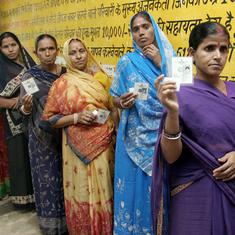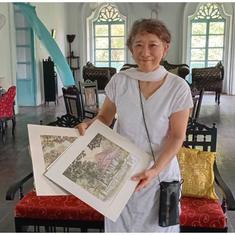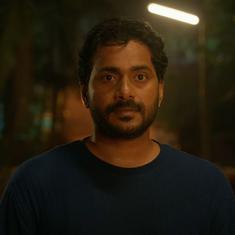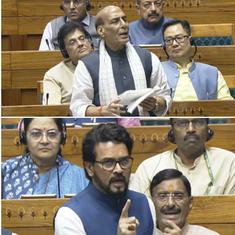When Sankar left for his wife’s village, he asked Ravi to come along. But Guramma would not permit it, because they needed Ravi’s help.
The sheep would have to be managed when they were woken up at dawn and led out to graze, and in the evenings when they had to be herded back into the shed. Those with fever would need injections. During the day, when the sheep were out grazing, the little lambs in the pens would have to be given leafy twigs to munch. At night, Ravi would have to join the neighbours in climbing neem trees to gather bunches of leaves. Lambs that had grown a little big for the pens would have to be taken to the nearby fields for a while and brought back.
It was not as if Ravi would do all this work. But he could at least lend a hand to Guramma and the girls.
Just as Ravi got ready to take Sankar on the motorbike to Porumamilla to catch the bus, they heard a commotion and stepped out.
People came shouting from the direction of the kapu street. “We need to find out who did this and tie him up,” they said loudly. “It is the gollas who committed this deed,” others commented.
“Find out who did this and beat him with a slipper. But it is not acceptable if you accuse all the gollas,
replied some of the shepherds confronting the kapus. Other gollas joined them in solidarity.
There were pipes attached to the motor fitted to the borewell to supply water to the entire village. Individual houses got water when the motor was turned on. A windpipe ten-foot high had been set atop the large cement tank outside the village for the air in the pipes to escape and to channel excess water. The cement tank’s purpose was to help wash the cattle, and it had been built by the government.
Someone had broken those pipes. All the water in the pipes had rushed out through the windpipe. After filling the tank, the water filled the holes on the ground and flowed towards the barren gutter by the cattle sheds. This meant the three streets on the upper part of the village would not get a single drop of water. Most of those houses belonged to the kapus.
They decreed that it was golla youth who had broken the pipes. They showed evidence to establish that none of the fields had water, and the gollas therefore broke the pipes to divert the water to the tank and make it available for the sheep to drink.
The borewell motor at best pumped out a thin stream of water, not more than one and half inches wide. And because of the broken pipes most of that water had seeped into the cattle ground to go to waste. The people in the upper streets did not know where to get water for their domestic use. Frustration led to anger and the anger was being directed at the gollas.
From dawn to dusk, you shepherds depend on our fields. It won’t be good for you if you argue with us despite the evidence of your misdeed, was the refrain from the kapus.
The conflict about water was turning into a caste conflict. Some of the golla elders stepped in. Though gollas, they resided in the upper streets and faced the water problem too.
“Yes, this was done by gollas. It is they who broke the pipes and should fix them now,” declared an elder.
“Are you not a golla? Does that mean you were involved in breaking the pipes too?” questioned a fellow golla.
“Why link this issue with caste? A golla is one who rears sheep. See that guy Tiripal Reddy – he rears sheep. He is a kapu lad by caste, but he is a golla now. There we have muthraasu Pichchanna, a flower seller, and chakali Munayya, a washerman – they all own sheep. They are gollas too. Their sheep may have drunk the water too. You all know who broke the pipes,” admonished the elder.
That ended the confrontation and people headed back to their homes. Some of them went to fix the pipes.
“Even if they are fixed, will they let them be? You think the shepherds can keep quiet if the sheep die of thirst? The shepherd will go to jail but won’t stop trying to provide water for his sheep,” said Gurappa sipping some water.
Ravi gave his father a strange look.
“If the rains don’t show up, god knows how many such fights we might see.” Gurappa washed his hands, went into the backyard to look for something and came back into the house. “By the way, peddoda, take Ravi with you,” he said.
Guramma did not object this time. She understood that her husband did not want the conflicts and tensions in the village to reach their sons.
Sankar was happy. The brothers decided to ride the bike all the way, and they reached Sankar’s wife’s village by afternoon.
They spent four days there, visiting the Siddavatam fort and the temples nearby. On the second day, they went to the Ontimitta Srirama temple, the Soumyanatha temple at Nandalur and the ruins of Buddhist monasteries. The next day, they spent time in the muskmelon orchards on the sandbanks of the rivulet.
Sankar’s brothers-in-law became good friends with Ravi. They invited him to come to Bangalore along with Sankar. But he did not want to give up his job hunt just yet. “I need to succeed … I must succeed.”
They would have stayed a few more days, but their sister called from home. “They are saying it rained in the Nallamala hills.”
They reached their village by evening.
Not a single drop of rain in the village though. Not even a brief drizzle.
Some villagers had gone to the Kasi Nayana ashram near Jyothi. They heard people at the ashram speaking about the rain in the hills and came back to the village with the news. Apparently, it rained a little in Varikuntla as well, but it was a good rain in the hills.
All the shepherds felt as if a weight had been removed from their heads.
Now they needed to find out where it had rained in the hills, locate the water bodies and decide on the trails to take the herds through. They needed to get ready for konda polam, hill-grazing: the practice of taking herds of cattle into the hills in search of water and grazing.
Two golla trackers, Gangayya and Pamuleti, went to do a recce of grazing spots and water sources. They got up before dawn, went to Narsapuram and rode the bus to Jyothi. The sun was up by the time they got down at Chelima Baavi, a wellspring in the middle of the forest.
From there, they made their way into the valley between the two hills. They reached Kurro’s well through Murikomma’s stream and the Grove of Teak Leaves. The well was dry. They climbed a nearby hillock, took some soil in their hands and tried to make a lump of it. The ease with which they could mould the soil showed there was enough moisture. It had rained a decent amount there, they reckoned.
They tested the soil again in Raasala meadow, and they investigated the Hidden Stream, after checking the Cloudy Stream and the Tiger Brook. Water was slowly coming up to the surface in the wellsprings. It would be enough to quench the thirst of men but not the sheep. Balappa’s well had water though.
The trackers crossed Bopidevi rubble to reach Eguvootlu, where a tubular aquifer broke through the hard stone. A thin stream of water was flowing from under the roots of the mango trees. This could quench the thirst of the animals.
The two shepherds stopped briefly for lunch at the Garudadri ashram and continued their trek to reach the Pamuleti hill through Velpudari. From there, they climbed the Obulam hill. They covered the Grove of the Sacred Figs, the Alli stream, the Springs of the Immortals, Rommana’s trench, the Mead of the Bald Oxen and other landmarks where water was likely to be found.
On top of one hill; near the tail of another; along the spine of hillocks; in the paths of streams and in valleys; on the plains and near the sandy tracts; on the mounds, pikes, ridges and fells; in the downlands, uplands, drumlins, knolls, banks and hogbacks; in the shrubs and under the grass heaps and in the crevices of rock beds they hunted for water. They bent down everywhere to pick up the soil and squeeze it for moisture. And where they found water, they tested it for quality – sipping a little or sometimes just smelling it or touching the surface. In most places there was no overflow of water. At some places, insects buzzed over rotten leaves covering up the water, making it quite dirty.
They did not rest anywhere for even a minute. Observing the lie of the land, memorising the locations of the water bodies and by walking so briskly that it was almost a run, they covered over forty kilometres of the forest by evening.
Grass and shrubs on hills got burnt by the heat of summer and green shoots appeared within two to three days of rain. The scouts did not set foot on the few unburnt hills that were thick with vegetation. It would have been difficult to extricate themselves if they got stuck in the thorny bushes. The herds would be led only to those hills and forests that had been blazed dry, where fresh grass grew after rain drenched the soil.
They slept at the Jyothi ashram that night and returned to their village by the early bus next morning. The gollas would have enough information now to begin the preparations for hill-grazing.

Excerpted with permission from Tiger Lessons, Sannapureddy Venkatarami Reddy, translated from the Telugu by Narasimha Kumar, Bloomsbury.










